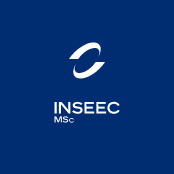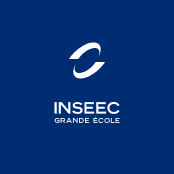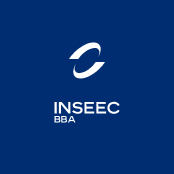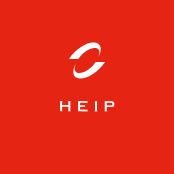Studies in Paris
Throughout the world, the capital is a destination synonymous with academic success and teaching excellence.
Why study in Paris?
Internationally, Paris enjoys an excellent reputation for its cultural influence and university network. Most students want to study in France, in the capital, to benefit from a level of education recognized throughout the world, facilitating access to prestigious post-secondary courses or parallel admissions.
Supporting a specific professional project, the various programs provide a unique opportunity to receive training from experts in the sector.
What studies to do in Paris?
The choice to attend a business school is shared by a very large number of students each year, after the Bac.
At OMNES Education, we offer a wide range of programs (Bachelor & BBA, MSc & MBA, Grande École Programs, DBA) that are deliberately designed to meet your needs. We offer programs in the following fields of study: Management, Communication, Engineering, Political Science and International Relations.
Graduating from this type of course guarantees a high rate of professional integration.
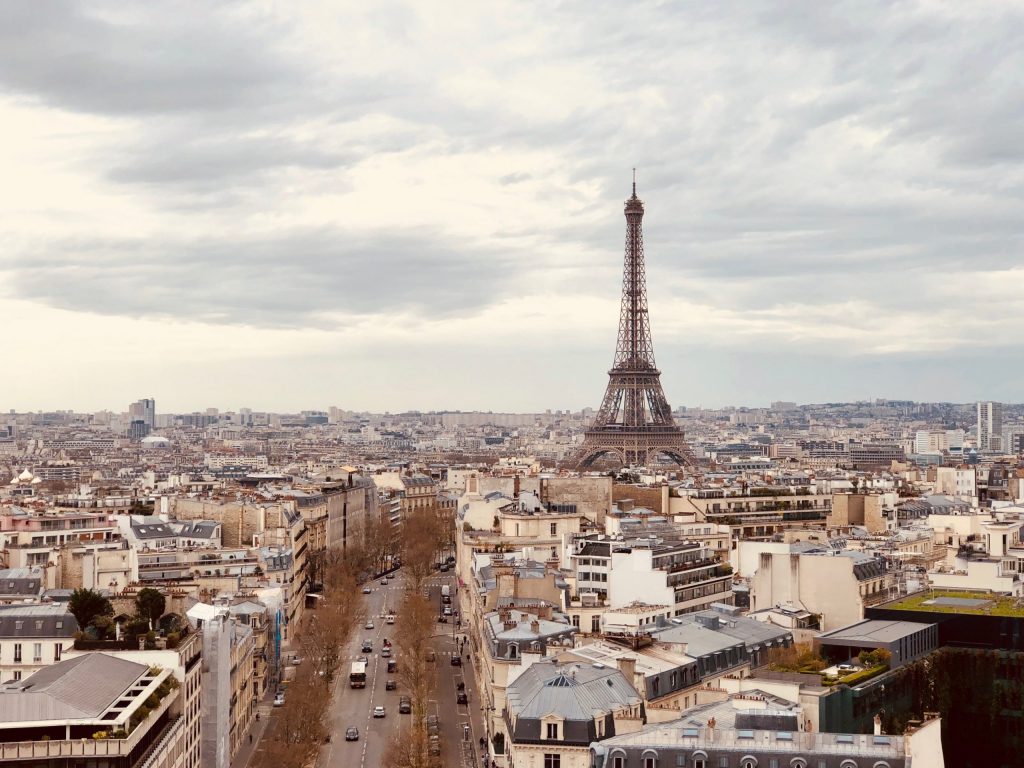
Discover Paris campuses
Living and studying in Paris makes it easier to find a job. The capital abounds with opportunities in all professional fields, in the private, public and semi-public sectors. Parisian employers of all sizes are always on the lookout for new talents.
Student life in Paris is also rich in cultural and extra-curricular activities. The capital boasts numerous monuments and museums that tourists from all over the world come to visit. Concerts, shows, sporting events and festivals take place all year round, not to mention the countless restaurants, cafés and bars in the world-famous city of Paris!
Paris is ranked 8th (out of 44) among French cities where it’s good to live and study (L’Étudiant magazine rankings).
To find out more about the capital, consult the Campus France fact sheet :
The Paris Eiffel Campus
The Paris Eiffel campus is home to OMNES Education‘s largest campus. Students from ECE, Sup de Pub and Inseec Bachelor all thrive on a 25,000 m2 site. A large lecture hall, an incubator, a Fab Lab, a cafeteria, a media library and an indoor garden offer a unique student environment, all just a stone’s throw from the Eiffel Tower.
10 rue Sextius Michel – 75015 Paris
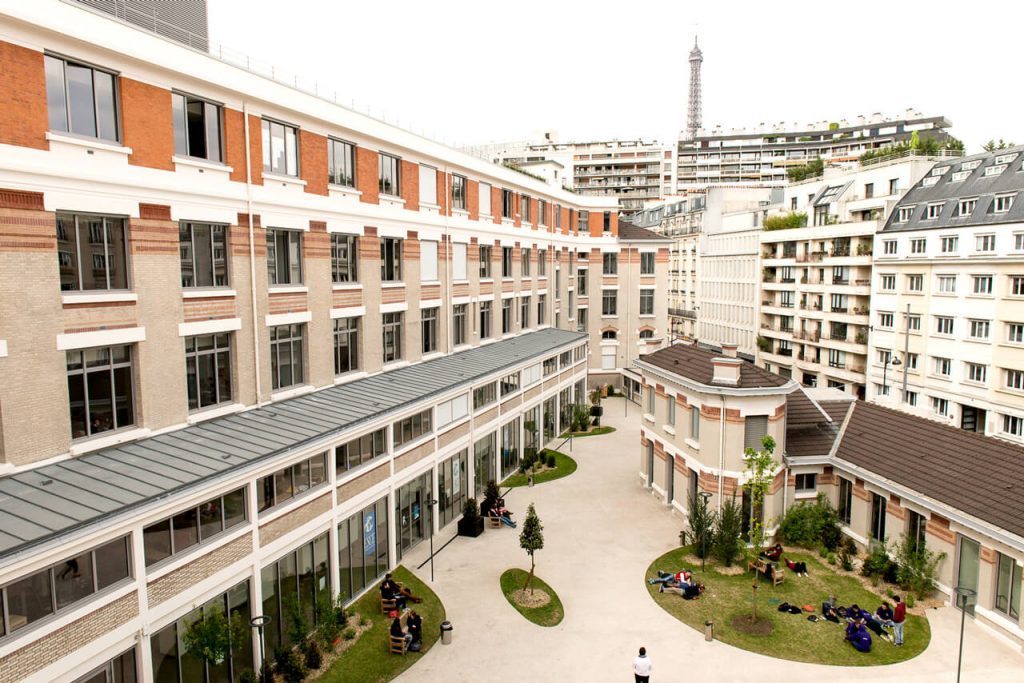
The Paris La Villette campus
The Paris La Villette campus, located between the Canal Saint-Martin and the Parc des Buttes-Chaumont, is home to INSEEC Grande École and MSc programs. This 8,800 m2 campus offers ideal conditions for studying: around 30 classrooms, several lecture theaters, a large co-working space, a cafeteria, a space dedicated to associations and a research center. Close to the Place de la République is the Sup Career school, which welcomes its students to a lively part of the capital. The number of companies concentrated in the Paris region offers future work-study students numerous career opportunities.
INSEEC Grande Ecole Campus :
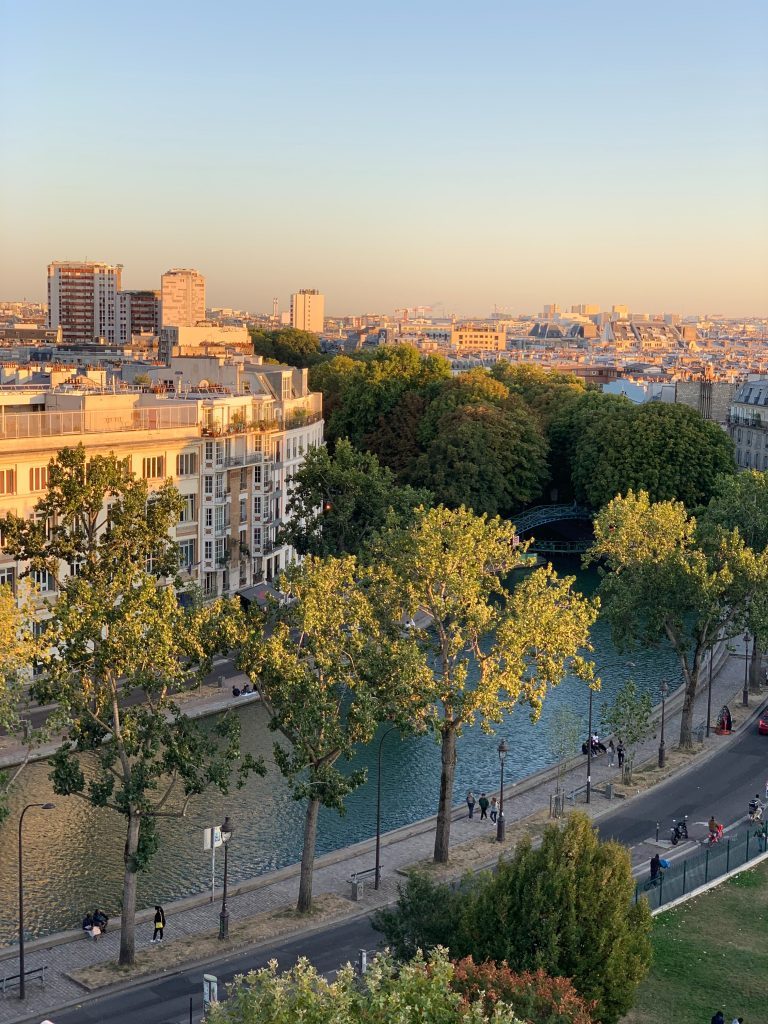
The Cœur Défense Campus
The Cœur Défense campus in the La Défense business district is home to ESCE business school, HEIP and INSEEC BBA.
110 Esplanade Charles de Gaulle
Our schools
Does Omnes Education offer programs in its schools in PARIS?
OMNES Education has 15 schools in France and abroad.
Business & Marketing
Come and study at the INSEEC Bachelor!
–
6 campuses
–
1 program
–
2 languages of instruction
Come and study at INSEEC Grande Ecole!
–
3 campuses
–
1 program
–
2 languages of instruction
International Business
Communication & Creation
Political Science
Engineering
Conditions of admission
Are there any specific criteria for studying in Paris?
To study in France, you need a valid passport or identity card, and a VISA if required. A correct level of French, previously established by a diploma (DALF, DELF), may be required to follow a course.

Paris Admissions
How do I enroll in a top school in Paris?
Every year, 350,000 foreign students come to study at a French university. The reception of international profiles is strongly encouraged and numerous financial aid schemes are implemented.
Non-European candidates
Students from outside the European Union must apply for a visa through Campus France. Once their registration with the school has been finalized, they must present a certificate of enrolment to Campus France as proof of VISA application.
European applicants
Access to French territory is free, regardless of the duration of the stay. Thus, a European student can travel without a VISA. This is one of the major assets that Europe offers.
Many exchange programs are offered to foreign students. Erasmus+ is one of the best known.
It is sufficient to send your application to a university in your country of origin when an agreement has been signed between the two institutions. If your application is accepted, you must then send your application to the desired French institution.
Visa
Do I need a visa to study in Paris?
Students living in the European Union
For a European student who wishes to study in Paris, it is not necessary to have a VISA. The French territory is free of access, whatever the duration of the stay.
Students from outside the European Union
Students from outside the European Union must apply for prior admission if they wish to do their first year of a Bachelor’s degree in a Parisian establishment. The application must be submitted to Campus France. It must be carried out between October and January, before the current year of study.
Niveau de français
Level of French
What level of French do I need to study in Paris?
In Paris, in order to study in an institution of higher learning, non-French speaking students must go through the DAP procedure. This is a language evaluation test available from the French cultural services in the country of residence.
Can you study in Paris without speaking French?
It’s possible to study in France without necessarily speaking academic French. A B2 level is required for the first year of study. This level corresponds to understanding the essential content of abstract or concrete subjects, and being able to lead a discussion involving technical terms. At OMNES Education, some courses are entirely taught in English.
How to apply
How to apply to an Omnes Education Group school to study in Paris?
Applying to an OMNES Education Group school to study in Paris is simple, but varies according to your profile.
First of all, it is necessary to provide a CV and a photocopy of your passport or identity card. The diplomas obtained as well as the transcripts are essential to constitute a complete and representative file of your course.
Language tests are also required in your file. You will provide French language evaluations (DALF, DEFL) as well as English language evaluations (TOEFL, TOEIC) if requested, to establish your ability to adequately follow courses at a French university.
Finally, depending on your objective, admission requirements differ:
- Bachelor 1 – Provide high school diplomas
- Bachelor 3 – 120 ECTS credits (2 years) or 60 US credits
- Master 1 – Bachelor’s degree (3 years) – 180 ECTS credits or 90 US credits
- Master 2 -Obtention Licence (4 years) – 240 ECTS credits or 120 US credits
find out all you need to know about studying in paris
Housing
A student wishing to live in Paris has several options.
To find out more, see our accommodation partners and solutions on our “accommodation” page.
Students residence
The implementation is managed by associations, the hostels are open to students aged 18 to 25. Priority is given to apprentices, trainees or those doing a sandwich course. The advantage of these places is primarily financial. In fact, room rates are significantly lower than those of private facilities. It costs about 600 euros if you want to adopt this option in the capital.
Stay at a local’s house
Having a room of one’s own, in the heart of a French family’s home, is a simple and economical choice that many foreign students make. In addition to enjoying low rent and the comfort of a large apartment, the main advantage of this type of residence is the daily immersion in French culture. Note that we can find an alternative to this type of rental. We are talking about intergenerational housing, putting students and seniors in touch with each other in order to bring company, in exchange for a room at a very affordable price.
Private appartement and collocation
This is the most common case. Many students choose to rent an apartment, usually a studio. Of course, wanting to rent in the capital has a cost. The average cost of a studio apartment is 800 euros per month. The economic choice consists in aiming for a larger apartment, and to live in it with several people, in a shared apartment. It is a good way to save money on various bills, but also to get to know a new culture, by learning the language.
Private student residences
This is a very common method of dealing with the housing shortage, private student residences. In the case of a refusal from the Crous, it is a good alternative to pay less than in standard rental and to have access to many advantages. They offer access to the internet, sports facilities, a rich community life or simply equipped and furnished apartments.
The cité Universitaire
In order to apply to this type of institution, the student must be enrolled in a school in the Paris region and be preparing a Master 1 level degree (at least). A true reference in the field, the Cité internationale universitaire de Paris has a large number of student accommodations that welcome students, but also sportsmen, artists or researchers of a higher level, coming from all regions of the world.
Activities
Explore Paris!
We have listed for you all the places to see and visit that the capital has to offer in terms of leisure, culture, sports and well-being.
Paris is a major cultural city, and you will most certainly find countless opportunities to go out and explore what the city has to offer.
The official website of the City of Paris and the official website of the Office du Tourisme et des Congrès are good starting points to find information on everything that may interest you:
Museums,
Libraries,
Sports facilities,
Markets,
Outdoor activities,
etc...
You’ll also find a calendar of free activities (exhibitions, screenings, etc.) here . For your information, the city of Paris is divided into 20 districts (called “arrondissements”). The last two digits of the Paris zip code indicate the arrondissement. For example, if the postal code of an address is 75015, it means it’s located in the 15th arrondissement. This can be useful when trying to locate a specific place.
Museums and art galleries
Detailed information on the many museums and monuments in Paris can be found here
Among the most famous and unmissable museums are the Louvre, Musée d’Orsay, Musée National d’Art Moderne (Centre Pompidou – Beaubourg), Grand Palais, Palais de Tokyo (Musée d’Art Moderne de la Ville de Paris)… Most national museums are closed on Tuesdays. European citizens under the age of 26 have free access to the permanent collections of national museums (temporary exhibitions are generally subject to a charge.) Other museums offer a reduced rate for students (a student card is required.) Most of them are free on the first Sunday of each month.
In addition to these great museums, Paris also offers the possibility to visit many small museums and art galleries such as the Fondation Cartier pour l’Art Contemporain, the Musée Rodin, the Maison Européenne de la Photographie, the Fondation Henri Cartier-Bresson, etc. There are many small art galleries in several districts, but especially in the Marais district (3rd and 4th arrondissements).
The “Arts & Culture” section of Time Out Paris can be a good starting point for finding information on current exhibitions.
Cinemas et theatres
Paris has the highest density of cinemas in the world (number of cinemas per inhabitant), giving you the opportunity to see almost any type of film you might be interested in, from independent foreign films to huge blockbusters. Some cinemas, particularly in the Latin Quarter, specialize in old classics or cult films. You can still watch recent releases either in their original version with French subtitles, or dubbed into French. Admission can be a little expensive (around €12 or €13), but most cinemas offer discounts for students (admission around €8). It is also often possible to buy a discounted multiple-entry pass.
Most cinema chains (Gaumont, UGC) focus on popular releases, while MK2 pays more attention to independent films. There are also many independent cinemas worth visiting for their program, but sometimes also for their building, history and atmosphere (la Pagode, le Louxor, le Cinéma des Cinéastes, le Studio 28…) There are weekly guides that can help you find films playing in any cinema: theOfficiel des Spectacles, for example. The guides also contain information on current plays and exhibitions.
For cinephiles, the Cinémathèque française is the place to be (screenings, festivals, museum, exhibitions, library, etc.).
During the summer, the City of Paris organizes free outdoor screenings.
If you want to buy tickets for shows and plays, visit Billetreduc.
If you’d like to discover French films with English subtitles, check out LostinFrenchlation.
Music
Paris also offers many interesting options for live music lovers, from large concert halls and open-air festivals to small independent venues and cafés. Among the most famous venues are the AccorHotels Arena, the Zenith and the Olympia. Smaller venues include La Cigale, Le Point Ephémère, Le Trabendo, La Maroquinerie and many others. All these venues offer an eclectic program, but tend to focus on indie and electronic music. Jazz lovers will find several jazz clubs in the city, particularly in the Latin Quarter and the 1st Arrondissement. These venues all have websites detailing their programs. You can also find a detailed program of most concerts in a free booklet called LYLO (Les Yeux Les Oreilles ) available in many bars and cafés.
As far as record shops are concerned, you can also take advantage of numerous options ranging from chain stores like the FNAC and Gibert Joseph – which are also large bookshops with well-stocked independent record shops (Born Bad, Pop Culture, Music Fear Satan, Souffle Continu, Ground Zero, Silence de la Rue…). More details available here.
parks and gardens
Paris has around 500 parks and gardens. Be sure to visit those in your area. Find out more here!
Sports
Sports clubs in Paris and on campus
Forest Hill Aquaboulevard
4 rue Louis Armand
Telephone: 01 53 78 10 90
Check with your school for discounts
Front de Seine
44 Emeriau Street
Telephone: 01 45 78 88 00
Squash Front de Seine
22 Theatre Street
Telephone: 01 45 78 88 00
Neoness fitness room (gym) 18 rue Juge
Telephone: 01 80 48 02 88
Pools
Keller swimming pool
14 Engineer Robert Keller Street
Telephone: 01 45 71 81 0
La Piscine Saint-Louis
2 rue Juliette Dodu, 75010 Paris
Swimming pool Pool School Atlas
18 rue de l’Atlas, 75019 Paris
Catherine Lagatu swimming pool
155 avenue Parmentier, 75010 Paris
Municipal Olympic pool
17 place Charles de Gaulle, 92400 Courbevoie
Swim Stars La Défense
56 passage de la Coupole, 92400 Courbevoie
Flea markets and second hand goods shops
If you want to find furniture, used clothes or anything else you need without spending a lot of money, flea markets are perfect!
Paris has listed all the capital’s flea markets here.
If you’d like to find out more about Paris’ cultural calendar, visit the official Paris Tourist Office website.
Costs
Please note that these prices are indicative and may vary greatly, and that the cost of living differs from city to city.
You can compare your home town with the numbeo website.
| Housing | 700 – 1200 € |
| Public transportation (Navigo pass) | 75 € |
| Power supply | 200 – 300 € |
| Other expenses (leisure, shopping…) | 200 – 300 € |
| Total | 1200 – 1900 € |
Opening a bank account in France is one of the first steps to take when you arrive in Paris.
The documents required to open a French bank account are :
- A copy of your passport or European identity card
- A document proving your residence in France – a certificate of accommodation from your landlord for example
- A copy of your certificate of studies attesting to your registration.
- A copy of your visa or residence permit
Currently, our main banking partner is the Caisse d’Epargne, and very soon new partnerships with local banks will be available with special offers for students.
| Partner agencies |
| Agence Paris Commerce 76 rue du Commerce, 75015 Paris |
| Agence Paris Croix Nivert 221 rue de la Croix Nivert, 75015 Paris |
| Agence Flandre 90 avenue de Flandre, 75019 Paris |
| Agency Paris Porte de Saint-Cloud 98 rue Chardon Lagache, 75016 Paris |
| Agence Paris République 134 avenue Parmentier, 75011 Paris |
| Agence Saint-Charles 123, Rue St Charles, 75015 Paris |
| Buttes-Chaumont Agency 126, avenue Simon Bolivar, 75019 Paris |
transportation
Metro
The Paris metro system is quite extensive and is the best way to get around. The metro consists of 14 lines and covers the central region of Paris and extends into some suburbs. As soon as you arrive, you must get a monthly pass called “Navigo”, or as a student you can get the “Imagin’R” card. It is more efficient to get a monthly pass than to buy a ticket every time you ride the subway.
Don’t forget to download the RAPT Bonjour application or consult the metro map.
If you prefer to walk, this map will help you find the distance between each “metro stop”.
RER
The RER is a fast train, larger than the metro, which crosses Paris and its suburbs. You must purchase a ticket, the cost of which varies depending on the area you are traveling to. The RER lines are named in alphabetical order from A to E. You must buy a special RER ticket if you choose to travel with this transport system or buy access to zones 1 and 5 on your Navigo.
bus
Buses are also convenient for short distances; however, for long distances, it is better to take the metro or RER. You can find a bus map on the website above.
Fares and tickets
1. T+ tickets
- One ticket (for all zones): €2.10 (* from May 2022)
- Book of 10 tickets (for all zones): €16.90
- One bus ticket: €2 (one-way tickets are sold only on board buses, valid for one bus journey, no changes).
You can view the entire selection of tickets on the following page: https: //www.ratp.fr/titres-et-tarifs
You can now buy your ticket directly on your phone with the application.
Origin-destination ticket
The origin-destination ticket allows you to travel between two stations in the Île-de-France region on the RER lines.
It is used in one way or another, for example: Paris – la Défense and la Défense – Paris. The one-way ticket from or to Paris, from or to La Défense, is €2.80. Tickets to or from Paris can use a metro and RER connection in Paris.
2. The Navigo Pass
- The weekly subscription from Monday to Sunday is €22.80 for all zones. It is valid on the metro, bus and RER in Paris.
- You can buy a monthly Navigo Passfor an unlimited number of journeys as soon as you arrive. With this card, you can use the metro, bus and RER in all zones. Currently, the cost for all zones with a monthly pass is €84.10 .
- Please note: Most subway stations do not have elevators or escalators. If you have heavy luggage to carry, you may have to carry it up the stairs.
The other option is to obtain a Navigo Pass. It is available immediately at the counter in metro stations and in authorized stores without having to fill out an application. It costs 5€. It is open to all (no obligation to live or work in the Ile-de-France). It is accompanied by a name card with photo (25x30mm format).
3. The Imagin’R card for students
This is a transport card valid for one year for students under 26, and for an unlimited number of journeys in the zones selected in advance. It costs €365/year (€30/month), i.e. 50% less than the Navigo pass (€84.10/month).
Whatever zone you choose, you’ll be able to travel throughout the Paris region at weekends, on public holidays, during vacation periods and from July 1 to August 31. The first day of validity of this card can be September 1, October 1, November 1, December 1 and January 1.
You can easily get more information on the Imagin’R website. Or you can ask at a counter in the metro for the form to fill in. Imagin’R also offers discounts on many leisure activities (cinema, etc.).
If you stay less than a year in Paris, and therefore do not use your Imagin’R card during the whole year, you can stop your subscription by sending a letter of cancellation accompanied by the document justifying that you are no longer a student, to the following address
AGENCE IMAGINE R – TSA 16039 – 95905 CERGY PONTOISE Cedex 9 by registered mail with acknowledgement of receipt at least 15 days before the end of your last month in Paris.
Vélib
Vélib’ is a large-scale bicycle-sharing company. To use the system, users must obtain a subscription or Pass, which allows subscribers an unlimited number of rentals. https://www.velib-metropole.fr/fr
- The Pass can be purchased for €5 for a one-day rental(PASS 24H CLASSQIUE) or €20 for a 3-day rental(PASS 3 JOURS).
- For occasional users, a V-Libre subscription can be taken out: €1 per 30 min for ordinary bikes and €3 per 30 min for electric bikes.
- For regular users, a 12-month V-Plus subscription (more than 4 journeys per month) can be purchased from €3.10/month, or a 12-month V-Max subscription for €9.30/month (€7.10 if you’re under 27), including ordinary and electric bikes.
- Please note: with a season ticket, bike rental is free for the first half-hour of each individual trip; the number of free trips per day is unlimited. A journey lasting more than 30 minutes will incur a charge of €1 to €4 for the next 30 minutes. Increased pricing is designed to keep bikes on the road.
For more information, to subscribe or buy a Pass, visit the Vélib website or download the application).
How does getting a bike work?
When you register, you can choose either to download the subscription onto your Navigo card or to obtain a Vélib’ Métropole card (which will be sent to your home.) Then, you enter your e-mail address and create a password to access your account. You must provide your contact information and agree to the Terms and Conditions of Access and Use (TACU). Payment is made by credit card via a secure area. To confirm the subscription, you must choose a 4-digit secret code, and an 8-digit access code. Both codes will be emailed to you and available in your online account. You will need your codes for your first rental. The Vélib’ Métropole card and the Navigo pass allow direct access to bicycles at Vélib’ stations.
To access a bike at the Vélib stations, swipe your Navigo card or your Vélib’ Métropole card on the screen, then enter your 8-digit access code and press the “V” button. Then enter your 4-digit code and swipe your Navigo card or your Vélib’ Métropole card again. Once the message “Start OK” appears on the screen, you can take your bike. To return your bike at the end of your trip, choose any Velib station, then insert the bike’s wheel into the delimiter so that it is locked. If the screen is not active, press the “V” button. When the “STOP” message appears and you hear two beeps, you’re good to go. If there is only one beep, you must put your bike back to lock it.
Discover cycle paths throughout Paris with the Vélib app or via this map.
Taxis
French cabs are licensed by the local prefecture, which imposes strict rules regarding technical inspection, passenger capacity (maximum three) and working hours. Private minicabs do not really exist, and all cabs operate in the same way and at the same cost in each region. They tend to charge more depending on the time of day (i.e. early morning and late evening). Paris cabs can be called in the street, in the numerous cab stands found in each arrondissement or booked by phone. The cab companies in Paris are the following:
- G7 (G sept): You can download the app or call the company at 3607 (the call is not free.)
- PAM 75 for people with disabilities
- Alpha Taxis
Transportions in europe and other destinations
If you are planning to travel in France or Europe after or during your studies, there are many starting points.
From three airports:
Orly airport
From or to Orly airport, you can use the following transportation:
- The RER B with a connection to Anthony with the OrlyVal shuttle – 35 minutes – €12,10
- The Orlybus – 30 minutes – €9,50
- Tramway T7 – 30 minutes – €1,90
- Bus 91-10 – 80 minutes – €6
- Tramway T9 + bus 183 – 60 minutes – €1,90
- RER C + 183 – 50 minutes – €6.40
For further information, please visit the Paris airport website. - Cabs: the flat-rate fare to Paris “rive droite” is €37, and to Paris “rive gauche” is €32. For further information, please visit the Paris airport website. Please note: real cabs are located in the stations at the arrival gates and are legally authorized to pick up customers. These official cabs can be identified by the illuminated sign on the roof of the vehicle. They must accept credit/debit cards as payment. We recommend that you book a trip in advance. If you are approached by people claiming to be cabs as you leave baggage claim, please refuse any offer of transport.
Roissy Charles de Gaulle airport:
From or to Roissy Charles de Gaulle airport, you can use the following transportation options
- RER B – between 35 and 25 minutes – €11,40
- Buses 350 & 351 – between 70 and 80 minutes – €6
- The RoissyBus – about 60 minutes – €12.50
For further information, please visit the Paris airport website.
- The SNCF Charles de Gaulle 2 train station offers several destinations throughout France.
For more information, please visit the Paris airport website.
- Cabs: the flat-rate fare to Paris “rive droite” is €53, and to Paris “rive gauche” is €58. For more information, please visit the Paris airport website. Please note: real cabs are located in the stations at the arrival gates and are legally authorized to pick up customers. These official cabs can be identified by the illuminated sign on the roof of the vehicle. They must accept credit/debit cards as payment. We recommend that you book a trip in advance. If you are approached by people claiming to be cabs as you leave baggage claim, please refuse any offer of transport.
Upon arrival, a wide range of services are available at both airports:
- ATMs if you need to withdraw cash. There are forty-five of them. For more information, please visit the Paris airport website.
- Exchange offices if you need to buy euros. There are three offices at Orly airport and fourteen at Charles de Gaulle airport. For further information, please visit the Paris airport website.
- Lost & Found offices If you’ve lost a personal item while passing through one of the airports, you can fill in an online form. If the item is found, it is sent to the Lost and Found Department of the Paris Police Headquarters. If an item is lost on board, in transit, in an airline lounge or on a boarding/disembarking bus, you must contact the airline’s baggage department. Any damaged or missing items must be declared before leaving the airport. For more information, please visit theParis airport website.
- Information kiosks help you stay informed and find your way around the airport. For further information, please visit the Paris airport website.
Beauvais Airport:
To and from Beauvais airport, you can use the following transport services:
- Paris-Beauvais shuttles: one-way ticket €15.90 – return ticket €29.00. For further information, please visit the airport website
- Regional train (TER) from Gare du Nord in Paris. For further information, please visit the airport website.
- Cabs: from Beauvais station to the airport, daytime cab fares are around €15 (7 a.m. to 7 p.m. weekdays). The night rate is around €20 (from 7 p.m. to 7 a.m. on Sundays and public holidays). The journey takes about 10 minutes. To get from Paris to the airport, you’ll need to pay around €170 for a day trip and €210 for a night trip. The journey takes between an hour and 90 minutes, depending on the time of day and your point of departure in Paris. We recommend that you book a cab in advance. For further information, please visit the airport website.
Upon arrival, many services can be offered to you:
- ATMs are available, as well as multi-currency ATMs.
- The Baggage and Lost Property Department can help you if your luggage is not delivered or if you forget something on the plane or at the airport. Any damaged or missing items must be reported before leaving the airport.
For more information on the above services, please visit the Beauvais airport website.
Transport by train from France :
- SNCF (transnational trains): Ouigo, Inoui, IDTGV, iDbus. Feel free to download the application SNCF Connect application.
In Paris, the SNCF stations are :
- Austerlitz station
- East Station
- Bercy Bourgogne – Pays d’Auvergne station
- Montparnasse train station
- North Station
- Gare de Lyon
- Saint Lazare train station
Rail travel in Europe
- Rail Europe
- Eurostar (Paris – London)
Getting to the city’s campuses
You can easily get to campus by metro, RER, or Vélib.
- The Eiffel campus is located in the 15th arrondissement.
Metro line 6 : Bir-Hakeim and Dupleix stations
Metro line 8 : La Motte-Piquet Grenelle station
Metro line 10 : Charles Michels station
RER C : Champs de Mars Tour Eiffel station
Bus 42 : stop rue Rouelle.
The nearest Velib stations: rue Emeriau, Boulevard de Genelle
- The La Villette campus is located in the 10th arrondissement.
Metro line 2 : Colonel Fabien station
Bus 75 : stop Sambre et Meuse
The nearest Velib station: Claude Vellefaux – Sambre et Meuse
- The Paris Auteuil campus is located in the 16th arrondissement.
Metro line 10 & 9 : Michel-Ange Molitor and Exelmans stations
Bus 62 : Exelmans stop
Bus 88 : Exelmans stop
The nearest Velib stations: Exelmans Michel-Ange and Molitor Michel-Ange
- The Cœur Défense campus is located in the La Défense business district.
Metro line 1 : Esplanade de la Défense station
Tramway T2 : La Défense – Grande Arche station
RER A, L, U : La Défense – Grande Arche station
The nearest Velib station : Arche-leonard de Vinci
Restaurants
Restaurants autour du campus Eiffel
Bakeries – between 5 and 12 euros
Boulangerie Le Gallic
133 avenue Emile Zola
Telephone: 01 45 75 20 64
Bakery and café: Le Fournil de Pierre
10 rue du commerce
Telephone: 01 45 75 16 48
A la petite chocolatière
66 avenue de la Motte Picquet
Telephone: 01 47 83 32 87
Boulangerie Poilâne
49 boulevard de Grenelle
Telephone: 01 45 79 11 49
Bakery SECCO
75 boulevard de Grenelle
Telephone: 01 45 67 17 40
Pistachio and chocolate
33/35 rue de lourmel
Telephone: 01 45 75 56 03
For those looking for gluten-free bakeries, you can find out more here.
International cuisine – between 5 and 15 euros
Brasserie Le Pont De Seine
1 boulevard de Grenelle
Telephone: 01 45 79 38 05
Café du Commerce
51 rue du Commerce
Telephone: 01 45 75 03 27
Le Bouquet de Grenelle
68 avenue de la motte Piquet
Telephone: 01 47 34 30 01
Café du Commerce
51 rue du Commerce
Telephone: 01 45 75 03 27
Main counter
29 boulevard de Grenelle
Telephone: 01 45 78 72 66
Bistrot dupleix
62 boulevard de Grenelle
Telephone: 01 45 77 24 96
Metropolitan
83 boulevard de grenelle
Telephone: 01 40 56 00 02
Le Pierrot
67 avenue de la Motte-Picquet
Telephone: 01 47 34 17 76
142 Contemporary creperie
59 Saint-Charles Street
Telephone: 01 40 59 84 01
Café Crêperie Suzette
117 boulevard de Grenelle
Telephone: 01 47 83 39 71
Au Moka
92 boulevard de grenelle
Telephone: 01 45 78 19 68
Tipaza (Eastern Cuisine)
150 avenue Emile Zola
Telephone: 01 45 79 22 25
Au dernier métro (Basque)
70 boulevard de grenelle
Telephone: 01 45 75 01 23
Pastapapa
7 rue Lourmel
Telephone: 01 45 77 66 47
Restaurant for high budgets – more than 20 euros
Tagawa (Japanese restaurant)
37 bis rue Rouelle
Telephone: 01 45 75 93 21
Le Concert de Cuisine (Japanese restaurant)
14 rue nélaton
Telephone: 01 40 58 10 15
Le Court Bouillon
51 rue du théâtre
Telephone: 01 45 77 08 18
L’Abreuvoir
24 Dr. Finlay Street
Telephone: 01 45 77 14 59
The campus cafeteria
We have a cafeteria on campus for you to enjoy your lunch. You can use the cafeteria from Monday to Friday.
You can also bring your own lunch. We have microwaves at your disposal.
Restaurants autour du campus La Villette campus
Bakery – between 5 – 12 euros
Baker – Patissier
50 avenue de Flandre, 75019 Paris
6 € for lunch
International cuisine – between 10 and 15 euros
Kimsou (burgers)
30 avenue de Flandre, 75019 Paris
Piatto (pizza, pasta)
32 avenue de Flandre, 75019 Paris
McDonald’s
2 avenue Secrétan – 75019 Paris
Professor wings
49 rue de l’Aqueduc, 75010 Paris
French cuisine – around 7 euros
Typick Café
37 quai de la Seine – 75019 Paris
6.90 € the student menu
Restaurants autour du campus Auteuil
Bakery – between 5 – 12 euros
Bakery
186 avenue de Versailles
75016 Paris
Bakery
100 Boileau Street
75016 Paris
Bakery
34 boulevard Exelmans
75016 Paris
Bakery
152 avenue de Versailles
75016 Paris
Catering
95 boulevard Exelmans
International cuisine – between 10 and 15 euros
O’Tacos
211 avenue de Versailles
75016 Paris
McDonald’s
234 avenue de Versailles
75016 Paris
Sakura
50 boulevard Exelmans
75016 Paris
Tokyo flavours
158 avenue de Versailles
75016 Paris
Big Buddha
107 Boulevard Exelmans
75016 Paris
French cuisine- between 10 and 20 euros
Le Trinquet
8 quai Saint Exupéry
75016 Paris
L’Indiana Café
2 place de la porte de Saint Cloud
75016 Paris
Moliteuil Brewery
55 rue Molitor
75016 Paris
CROUS restaurants
There are 15 university restaurants around Paris. Find the list here !


